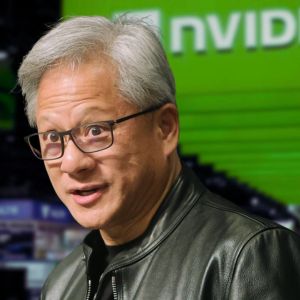
Nvidia’s chief executive, Jensen Huang, is countering fears about artificial intelligence (AI) resulting in mass unemployment. Huang talked to CNN’s Fareed Zarkaria about AI as a positive force . He called it “the greatest technology equalizer the world has ever seen.” As Nvidia’s CEO noted in his paper, there will always be jobs, but AI is expected to alter working practices across every industry and profession. He said everyone else’s job would be 50% less than normal, but that didn’t mean there would be no jobs left for people. Work would change, not vanish, he argued. He said it is one example of how AI enables people who are (or aren’t) computer literate to become more productive. Huang mentioned the number of new users to ChatGPT, saying that even on their first try, they saw value in it. According to him, AI is just about the empowerment of people. On the other hand, Huang underscored that AI is a tool, not a weapon. Its filing times have gone from those built on specialized knowledge to becoming something AI should be able to handle in load times. He says the AI trend is not about devaluing human workers but valuing them more. AI will reshape the workforce with more opportunities Though the Nvidia CEO acknowledged that some jobs could be automated out of existence, he emphasized the potential for new opportunities. Huang said AI is not here to replace humans, but rather “to augment human capabilities.” He foresees new jobs in AI, from training models and engineering prompts to curating data, managing humans, and ensuring AI ethics. This is consistent with earlier shifts during the industrial and digital revolutions, when technology replaced some jobs but created many new industries and jobs. He added that AI was a “co-pilot,” rather than a competitor. Automation of repeatable and boring work can free humans from focusing on creative, strategic, and people work. He said this will improve health, education, financial, and agricultural systems. More crucially, Huang stresses the need for societies to retrain and educate workers to make this transition. People need to be educated to cohabitate and work with the AI, and riding the back of this dragon is the secret to a world and economy that spins ever upward. Nvidia challenges apocalyptic AI predictions Huang’s view contrasts with some of the more dystopian notes of the AI industry. In May, Dario Amodei, the CEO of the $61.5 billion artificial intelligence startup Anthropic, told Axios that AI might be able to strip half of all entry-level white-collar jobs from the global economy within the next five years. He warned that unemployment figures could climb double if the switch isn’t handled well, rebounding from 10% to 20%. In just a year, AI systems could write all the code a business requires, Amodei said. Some, such as Adam Dorr, an employee of the Wells research house RethinkX, believe that AI and robotics could automate away virtually all human labor by 2045. The transition will be difficult, Dorr told The Guardian, and there isn’t much time to get ready for the shift AI will herald. But Huang is still not caving to panic. He believes such doomsday scenarios fail to consider the possibility of AI as a force for good for humanity. “The effect of AI is not so much replacement but transformation,” said Huang. The AI revolution is being driven in no small part by Nvidia, which Huang heads. The company’s chips power some of the world’s most advanced AI models, such as the ones underpinning ChatGPT and other large language models. But Huang insists that such technology should empower, not replace, humans. As the world grapples with adapting its workforce for the era of silicon and artificial intelligence, Nvidia’s CEO offers a clear message: Don’t fear AI—use it to redefine the future of work. KEY Difference Wire : the secret tool crypto projects use to get guaranteed media coverage


